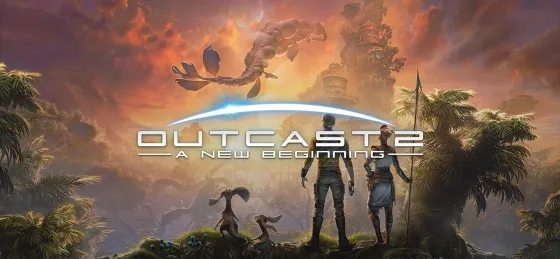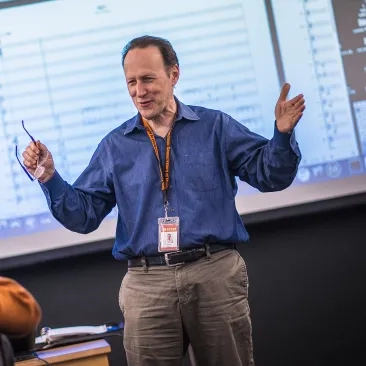2024's Hotly Anticipated Sequel to Video Game 'Outcast' Scored by SFCM Professor, Alumni
News StoryTechnology and Applied Composition faculty and composer Lennie Moore gives an inside look at what went into scoring the long-awaited video game and the SFCM talent behind it.
Twenty-five years later, one of the first 3D open-world video games ever made is getting a sequel, and it has major SFCM musical talent behind it.
SFCM Technology and Applied Composition (TAC) professor Lennie Moore is the lead composer behind Outcast: A New Beginning set for release on March 15, 2024. The game, released by THQ Nordic, is a direct follow-up to the immensely popular 1999 game Outcast, in which Moore also served as composer.
For the sequel, Moore commissioned the help of several SFCM TAC graduates including Jonathan Parra (Shyloom), Justin Yeo, Shawne Workman (also on SFCM faculty), and Igor Nemirovsky (who studied composition with SFCM's David Conte) helped with the orchestration. The video game is a science-fantasy action-adventure game, where players explore a living alien world and fight with special powers.
SFCM sat down with Lennie Moore and found out more about the composition behind the game and what students can learn from it.
How did you come across the project?
I was the original composer on the first game of this series back in 1999. That score was one of the first live orchestra and choir scores in games, and was considered a landmark score in the industry.
What goes into scoring a video a game?
Scoring a video game is a complex puzzle, which is one of my favorite joys about composing in this medium.
Music for most media is linear and synchronized to a timeline or to images. In games, it's individual player and game designer choices which inform how the music experience will be expressed.
This involves more of a deconstructionist approach, where I figure out how to break down my composition and orchestration elements into pieces like vertical layers, horizontal procedural components, or a blend of both—as it is in this score—to then implement into the music playback system in real-time for the player while following the goals or structure of the music design. If I do this well, it still sounds like a complete music experience.
Prompts are usually everything from conversations with the game developers on what they would like in the score, to a script, story outline, images, character animations, video footage, or a playable demo of the game.
Can you describe the process and timetable for scoring a game?
Game development typically takes anywhere from two to five years on a given project. The time frame for scoring depends on the scope of what's needed (usually three to four months for an hour of material) and can occur anywhere from several years pre-release up to beta (about six months before). I've been involved in the development of A New Beginning's score since 2019. There is about an opera's length of material in this score (two hours and fifteen minutes) with an incredible amount of layers and procedural elements.
The process is in some ways similar to other work in media, in that the client will give me an idea of the type of music they would like, along with a structure with all cues broken down into a list or Excel/Google Sheet.
The distinctive aspect of scoring for video games is in the deconstructionist elements. I have to break down what I'm composing into pieces and choose how they will be then implemented into the music engine, which will then perform the soundtrack based on what individual players choose when they are playing the game (based on a rules system that I develop in collaboration with the game producers). To make things more complicated, A New Begninning is an open-world environment, where players can travel in any direction and choose various encounters or quests along the way. The music for this game has several cues assigned to each village and area (forest, coastline, desert, etc.) as the player traverses the environment. The trick in an open-world system like this is to create a method where music will smoothly transition through each area in the world.
The main point I would make about the creation process in games is to be really organized! Thinking through all the possible parameters and creating material that elegantly maneuvers through these game conditions is an important component in what I do. I then create all my themes and develop every cue to function within all these parameters.
Can you talk about the music selection process?
The instrumentation for this project is a combination of a 78-piece symphony orchestra, 24-voice choir, electronics (synths and custom music design elements), and international solo artists including Tina Guo (cello), Manu Delago (hang drum), Andy Suzuki (flute), Mathilda Mann (mezzo-soprano), percussionists MB Gordy/Christopher Garcia/Mark Griskey, along with SFCM Alumni Helen Newby (cello) and Teddy Raven (kaval).
Tracking on this project occurred during the COVID lockdown. All the soloists recorded remotely in their homes. The orchestra and choir had to be recorded in sections (high strings, low strings, choir, woodwinds/piano/harp, and brass/orchestral percussion) in order to maintain social distancing as best we could, which actually worked better for creating interactive layers used in the game. The recording orchestra and choir I used was located in Sofia, Bulgaria. I monitored all the recording sessions via web-based audio streaming tools, and the soloists just did their thing and sent me their finished audio tracks, which I then edited into the Pro Tools sessions along with the orchestral recordings.
What do you pull from for inspiration?
I draw from a multitude of sources for inspiration. Concert music, film and video game scores, jazz, whatever! As this was a sequel, the original score I did was important in re-establishing themes and style, as well as creating new themes unique to this game. Another main point of inspiration is the game itself, and the world that the artists and game designers are creating for A New Beginning. The look and feel of the world of Adelpha is stunning, and a wonderful setting for an amazing adventure.
What do you hope students take away from this?
Video games are a wonderful and challenging form of music creation and performance. They are equal to any other form of media as far as quality and depth of expression. Some might argue that they might be a more interesting and deep music experience, as the players of these games are immersed in these worlds, and therefore, the music experience feels more personalized to them.
In my mind, they are also a complex challenge to do well, which is why I get so much enjoyment working in this format. I just love solving puzzles!
Learn more about studying Technology and Applied Composition at SFCM.

